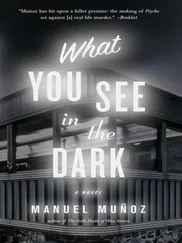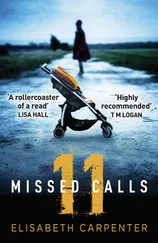That’s all, Niki says. Then I went downstairs and worked until three and came home. I wanted to tell you about it last night but last night you weren’t in such great shape, as I’m sure you remember. Do you? Do you remember anything about last night? Falling asleep at the kitchen table? With your cigarette still burning? You almost lit yourself on fire.
Aris says something but his voice is swallowed up by the sheet.
What did you say? I can’t hear you. Come on out from under there already.
Her hands are sweaty. She wipes them on the sheet and looks at her palms. Then at her fingers. For the first time she notices how yellow they are. She’s been smoking too much recently. Her fingers seem smaller, too. It must be her imagination but she’s terrified by even the thought that her body has started to fall apart, to shrink. In the past she would have laughed at the idea. She would have told Aris: look at this, my fingers are shrinking. I’ve actually been working my fingers to the bone. And they would have laughed. They would have put their hands together to see how much bigger his fingers were than hers. Then Aris would grab them one by one and tugged on them to make them longer. They would laugh and laugh. But now Niki is afraid. There are so many small tiny things that frighten her. And then there’s that pain in her chest. As if something in there is broken. As if something in there broke or got knocked out of place. She can feel some hard thing hanging in her chest like a broken spring. She observes the lines carved into her palms. Too many to count. Straight and crooked and curved. Some like barbed wire others like uprooted trees. Still others cross one another and fade away, or stop suddenly like a road that dead-ends into nothingness.
You should have called the stations.
Aris has pulled the sheet down from over his head and is looking at her. White as a ghost, lips dry, eyes bloodshot. His hair sticking up on one side like the plume on the helmet of an ancient warrior emerging from a bloody battle.
About what?
You should have called the stations, Aris says and turns his face away. They’d kill for that kind of news. You know, human interest stories. They would have gone nuts. You should have called and told them to come to the hospital and then asked to be paid for giving them the scoop. They would have given you something for sure. Even a little would have helped in our situation. Better than nothing.
He rubs his eyes then slips his hands under his head. He stares up at the darkening ceiling.
Niki can’t see his hands.
She gets up out of the bed and goes over to the balcony door. Now the sky is a dark violet color. She sees a few stars flicker and the lights of an airplane slowly disappear. The banner is still hanging from the chimney of the electric plant but tonight there are no floodlights or striking workers. The strike was deemed illegal, they said on TV. Tonight things are calm again. All that’s left is the banner hanging from the chimney, a long, narrow white banner with red letters which if you saw it from a distance, from the sea, would look like a huge gauze bandage spotted with blood.
You should have called the stations, Aris says. Now it’s too late.
Niki looks at her palms and brings that image once more to mind. The girl in the hospital. How she leaned forward with one hand stuck to the young man’s and the other extended toward Niki. The thin white hand Niki was afraid to touch. She wanted to do something for that girl. Something, anything. But now there was no point. She’ll learn to live with that. Compromise. All of life is one big compromise. We’re all born of compromise, Niki thinks, out of that great silent yes that our parents say when they choose to bring us into this world. Which means that we all carry a kind of compromise inside us, in our blood. That’s why all revolutions are destined to fail. Then she thinks how she shouldn’t waste time thinking about things like that. She should think instead about where she’s going to find the money that they need and about the bank and the house and Aris who is still lying under the sheet — unspeaking unmoving defeated. She thinks that if things go wrong, if they don’t find some way, she’ll take some superglue and stick one of her hands to Aris’s and the other to the wall. That’s what she’ll do. Then let them come and try to kick her and Aris out of the house. This isn’t America. They can come if they want. She and Aris will be waiting.
She might even call the stations.
In the distance she sees a boat steaming off with all its lights on. A woman walks by in the street pushing a baby in a stroller. Two men stand talking on the sidewalk. One is smoking and the other is carrying a fishing pole and a blue plastic bag.
And then she doesn’t want to see anything or think anything anymore. She closes her eyes and leans on the glass of the balcony door and with her eyes closed listens to the darkness of the house spreading itself around her and listens to the heartless hum of cars down below in the street.
FIVE MEN had lit a fire outside the Social Security offices in Nikaia in the middle of a January night. They were retirees, former office workers or manual laborers, unshaven and down at the heels. They’d started gathering there at three in the morning so they’d be the first to see the doctors before the crowds came and the line stretched all the way to the sidewalk. They didn’t know one another and didn’t bother to introduce themselves — they had other things on their minds. Besides, their names didn’t matter. What mattered was the order, that the order of the line be strictly maintained. Which is why each man thought of himself and the others as numbers in a list that would keep growing as the night advanced.
They were five men but also five numbers.
That was one of the things they had on their minds.
• • •
They had lit a fire on the sidewalk in front of the steps.
Winter, bitter cold, a night that seemed to stretch on forever. It had rained early that evening and now the damp had turned to frost that sparkled like silver dust on all the parked cars. At first they paced up and down on the sidewalk to get warm, watching silently, with a kind of awe, as their breath rose into the darkness like smoke signals. Then the first man to have arrived, number one, who had cataracts and was almost blind in his right eye, had an idea. They could light a fire with some wooden pallets and cardboard boxes that were piled next to a dumpster on the street. The others agreed right away because they were all very cold. One of them remembered that on his way there he’d seen a bunch of barrels outside of a building site on the next street over. He suggested they bring a barrel over and light the fire in it. They agreed to that, too, because they needed some way to keep the fire going until morning — that was another thing they had on their minds.
Two of the men went to get the barrel, revolving it heavily over the sidewalk, and set it in front of the steps of the Social Security building. Then number three, a heavy-set man in his seventies with a polyp on his intestines, broke up one of the pallets and stacked the planks in the barrel. Beneath the planks he’d already put some little branches he pulled off the mulberry tree on the corner. They lit the fire with a newspaper. It wasn’t easy because the wood was damp. But when the fire finally got going, they ripped up two cardboard boxes and tossed the pieces on top of the wood. Then they all gathered around the barrel and stretched out their hands and watched silently as the flames leapt before their eyes. All except for number two, who had brought a small folding stool from home because he suffered from sciatica and couldn’t stand for very long. He opened the stool and sat down with his legs crossed and looking absentmindedly at the fire murmured in a husky voice like a chant:
Читать дальше












